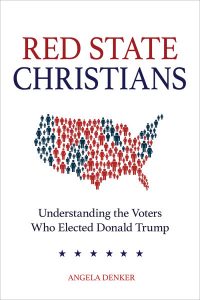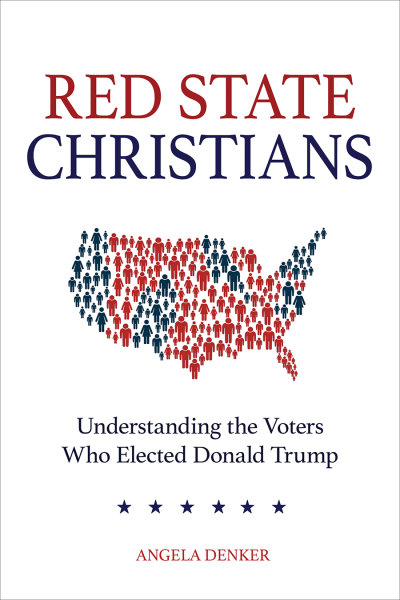
by Lee Ann Pomrenke
It is a terrible feeling, being blind-sided. Election Day 2016 left me staring down my own ignorance and resulting shock that so many of my fellow citizens voted for the candidate I thought had disqualified himself repeatedly. So many Christians. If that embarrassing vulnerability resonates with you, I highly recommend Angela Denker’s Red State Christians: Understanding the Voters Who Elected Donald Trump as a key way to “do our homework” so that four years later we will be better informed and better prepared. Also, Denker’s narrative style and theological insights make this essential investigation so much more engaging than schoolwork implies.
First, there were subjects I knew nothing about. From my place in what are called mainline Protestant congregations (in my case, ELCA Lutheran) I had no idea there are Evangelical mega-churches where Christian Nationalism is so powerful that the Sundays nearest Memorial Day, the Fourth of July and Veteran’s Day are on par with Christmas and Easter. Angela Denker takes readers on provocative field trips to such worship services so we can observe for ourselves how the honoring of military service is conflated with Christ’s sacrifice. She steers the bus towards places I am highly unlikely to go on my own: the March for Life, college football departments in Florida, and an Arab-American Evangelical worship service in Texas.
And what do we learn? Nuance. Many, many human beings are capable of one opinion in general (one of her examples is objecting to gay marriage rights) and another approach in particular (still loving the gay family member). Abortion and gun rights are not nearly as influential among the voters and their communities we visit with Denker as I previously thought or assumed. There are layers of ambivalence and negotiation between the cultural and religious values of Red State Christians who voted for Trump; and for the most part our guide describes them compassionately, despite her frustration (and mine) at the “distortions of the Gospel.”
Denker deftly directs our attention towards cultural trends that laid the groundwork for different demographic groups’ support for Trump, from the Orange County mega-church pastors with their best-selling books and public profiles that made “celebrity” palatable and even desirable among Evangelical voters, to “purity culture” and its resulting devaluing of women. The video of Trump claiming that if you’re famous, women let you grab them, was no big deal to women in some Red State Christian circles who endure so much worse.
Interviewees among mainline Protestant churches in Missouri and the Rust Belt actually admit that racism played a role in their vote, but not in the way the media or “liberals” might characterize. Rather than participating in this part of the course with a smug expression on my face, I experienced a rebuke. Among Red State Christians there is a common thread of resentment of being labeled as “racists” for voting for Trump, without fully reckoning with the legacy of white supremacy. The pride in being American appealed to them, because they are exhausted with being ashamed and belittled, being told that they did not get to where they are today only through their own efforts, but without the means to unpack that truth about white privilege. There is a nearly palpable sense of grief among some that “the truths that have sustained their power (as white Christians) are changing” (p. 240). Out of this fear – grief at its core – comes the action item that follows from this curriculum.
Denker astutely recaps one conversation with a bi-racial teenager like this:
“I recognized the tension here between the idea that the white majority had been shamed by Democrats and the idea that the black and multiracial minority had been swallowing their hurt for generations in rural midwestern America. We need to find a middle ground where people can repent and forgive one another without the halting effect of shame, so that everyone can heal.” (p.120-121)
People of faith who do not identify as such must help our Red State Christian siblings unpack their pain and reckon with our country’s original sin: white supremacy. What we can control most in that process though, is our own approach. We cannot risk continuing to talk past each other, or lobbing insults at one another, with the next election one year away. We have to talk about race without naming the other “deplorable,” to make ourselves vulnerable and humble while honestly trying to hear each other. We know how to do this since confession and forgiveness are the marks of our faith. The Gospel of Jesus Christ is for those who feel powerless, undervalued, or no longer seen. We declare that losing our power in Christ’s love is the goal of our faith. And we know how to host a funeral, where grieving the loss of those we hold dear and hope in resurrection are deeply intertwined.
As a reader, a participant in this eye-opening class on Red State Christians, I started understanding not only the thought processes and influences on Red State Christians, but how my own interactions affect this Christian “extended family.” In our families and on social media, we must discipline ourselves to prioritize nuance, while doing the work of anti-racist, anti-bigotry activism. We are all a product of multiple influences, but because we have the resurrection promises of Christ in common with others who are Christians, this is our way in: faithful, repeated witness to whom we know Jesus to be.

Red State Christians: Understanding the Voters Who Elected Donald Trump
By Angela Denker
Fortress Press, Available Aug 2019
ISBN: 9781506449081
Rev. Lee Ann M. Pomrenke is a Lutheran (ELCA) pastor, writer and mother in St. Paul, Minnesota.

